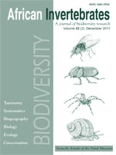
AFRICAN INVERTEBRATES
Scope & Guideline
Advancing Knowledge of Africa's Invertebrate Ecosystems
Introduction
Aims and Scopes
- Taxonomy and Systematics:
Focuses on the identification, classification, and description of new species across various invertebrate groups, such as insects, arachnids, and nematodes. - Biodiversity and Conservation:
Addresses the biodiversity of invertebrate species, exploring their ecological roles and the implications of conservation efforts in different African ecosystems. - Morphological and Molecular Techniques:
Utilizes a combination of morphological assessments and molecular techniques, including DNA barcoding, to uncover species diversity and relationships among taxa. - Ecological Studies:
Investigates the ecological interactions and habitats of invertebrates, contributing to a better understanding of ecosystem dynamics and health in African environments. - Historical and Collection-Based Research:
Highlights the importance of historical collections and previous research efforts in expanding our knowledge of African invertebrate diversity.
Trending and Emerging
- DNA Barcoding and Molecular Phylogenetics:
An increasing number of studies are employing molecular techniques, particularly DNA barcoding, to elucidate species diversity and phylogenetic relationships, emphasizing the integration of molecular data in taxonomy. - Description of New Species:
There is a notable surge in the publication of new species descriptions, indicating a rich and largely unexplored invertebrate diversity in Africa, particularly among Diptera and Hymenoptera. - Focus on Endemic Species:
Research highlighting endemic invertebrate species and their conservation status is on the rise, reflecting a growing awareness of biodiversity hotspots and the need for targeted conservation efforts. - Ecological Impact Studies:
Emerging studies are increasingly linking invertebrate diversity with ecological health and ecosystem services, underscoring the crucial roles these organisms play in their environments. - Interdisciplinary Approaches:
There is a trend towards interdisciplinary research that combines entomology with other scientific fields such as ecology, conservation biology, and environmental science, enhancing the relevance and impact of invertebrate studies.
Declining or Waning
- General Surveys without New Findings:
The trend of publishing broad surveys or checklists without significant new taxonomic contributions appears to be waning, as researchers increasingly aim to provide novel insights or descriptions. - Non-Species Specific Research:
Papers that focus on broader ecological or environmental assessments without specific invertebrate taxa are becoming less common, suggesting a shift towards more targeted research on specific groups. - Historical Collection Reviews:
While historical reviews remain valuable, the frequency of papers solely dedicated to reviewing past collection efforts or specimens has decreased, as the emphasis now leans towards contemporary fieldwork and new discoveries.
Similar Journals
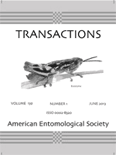
TRANSACTIONS OF THE AMERICAN ENTOMOLOGICAL SOCIETY
Unveiling Insect Insights for a Deeper Understanding.TRANSACTIONS OF THE AMERICAN ENTOMOLOGICAL SOCIETY, published by the American Entomological Society, is a distinguished journal committed to advancing the field of entomology through innovative research and comprehensive reviews. With an ISSN of 0002-8320 and an E-ISSN of 2162-3139, this journal has been a vital resource for entomologists since its inception, showcasing significant findings in insect science as well as ecology, evolution, behavior, and systematics. Although currently not offering Open Access, the journal remains a pivotal platform for professionals, researchers, and students interested in the biological sciences related to insects. The journal's influence is reflected in its Scopus rankings, with a Q3 designation in Insect Science and a Q4 designation in Ecology, Evolution, Behavior and Systematics as of 2023. With a convergence of published years from 1993 to present, TRANSACTIONS aims to foster a deep understanding of insect-related topics, thereby contributing valuable insights that may influence both academic and practical realms within entomology.
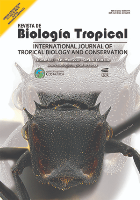
REVISTA DE BIOLOGIA TROPICAL
Fostering collaboration for a greener future.REVISTA DE BIOLOGIA TROPICAL is a prominent scholarly journal published by the Universidad de Costa Rica that serves as a vital platform for research in the realms of agricultural and biological sciences. Established in 1969, the journal has evolved into a crucial resource, contributing significantly to the understanding of tropical ecosystems and biodiversity. With its current classification in the Q2 quartile for Agricultural and Biological Sciences, it ranks #109 out of 221 journals in its category, reflecting its esteemed position within the academic community. Although it operates under traditional access guidelines, the journal remains committed to disseminating high-quality research that informs conservation efforts and sustainable practices in tropical biology. The journal's diverse scope encompasses a wide range of topics, ensuring relevance for professionals, researchers, and students dedicated to enhancing knowledge and innovation in the biological sciences. As the journal progresses towards 2024, it continues to invite contributions that advance scientific discourse and foster collaboration within the field.
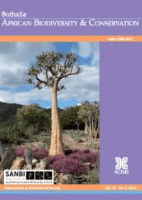
BOTHALIA
Empowering ecological understanding since 1978.BOTHALIA is a prominent open-access journal dedicated to advancing the fields of Ecology, Evolution, Behavior, and Systematics, as well as Plant Science. Published by the South African National Biodiversity Institute (SANBI), this journal has been disseminating valuable research since 1978 and has embraced open access since 2014 to enhance the visibility and accessibility of scientific knowledge. With an ISSN of 0006-8241 and E-ISSN of 2311-9284, BOTHALIA plays a pivotal role in promoting biodiversity research in South Africa and beyond. In the recent Scopus rankings, it has been positioned at Q4 in both relevant categories, highlighting its contributions within the broader scientific community, despite being in its growing phase amidst competitive rankings. The journal aims to publish high-quality articles that address critical issues in biodiversity and ecological sciences, making it an essential resource for researchers, professionals, and students committed to understanding and managing our planet's biological heritage.
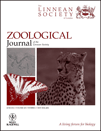
ZOOLOGICAL JOURNAL OF THE LINNEAN SOCIETY
Championing scholarly excellence in zoological studies.Zoological Journal of the Linnean Society, published by Oxford University Press, stands as a prestigious vessel for scholarly discourse in the fields of Animal Science and Ecology. With an ISSN of 0024-4082 and E-ISSN 1096-3642, this journal has an illustrious history dating back to its inception in 1866, and has consistently contributed groundbreaking research that shapes our understanding of zoology and evolutionary biology. Operating out of the United Kingdom, the journal boasts an impressive Q1 ranking in both Animal Science and Zoology and Ecology, Evolution, Behavior and Systematics, positioning it among the top tier of its category. With a significant presence in the academic landscape, the journal ranks 24th among 490 in Animal Science and 97th among 721 in Ecology, reflecting its impact and relevance in the field. Although it is not an open access journal, the wealth of knowledge it offers is invaluable for researchers, professionals, and students alike, aiding in the advancement of zoological sciences.

FRAGMENTA ENTOMOLOGICA
Advancing knowledge in entomology and ecology.FRAGMENTA ENTOMOLOGICA is a prominent peer-reviewed academic journal published by UNIV DEGLI STUDI DI ROMA LA SAPIENZA, focusing on various dimensions of entomology and insect science. With an ISSN of 0429-288X and an E-ISSN of 2284-4880, this journal has embraced an Open Access model since 2006, ensuring that valuable research is widely accessible to the global scientific community. Based in Italy, at the DIPARTIMENTO DI BIOLOGIA ANIMALE E DELL'UOMO in Rome, FRAGMENTA ENTOMOLOGICA is recognized for its commitment to high-quality research, ranking in the Q3 category across multiple categories, including Ecology and Insect Science, in 2023. Its Scopus rankings further underscore its relevance, showcasing its role in advancing knowledge in the fields of Ecology, Evolution, and Insect Behavior. This journal serves as an essential resource for researchers, professionals, and students interested in the intricate world of insects and their ecological roles, fostering academic discourse that bridges theoretical and practical entomological studies.

COLEOPTERISTS BULLETIN
Diving Deep into Beetle Biology and EcologyCOLEOPTERISTS BULLETIN is a pivotal journal in the field of insect science, particularly focusing on the fascinating world of beetles. Published by the COLEOPTERISTS SOC, this journal disseminates high-quality research, illustrations, and literature reviews since its inception, with contributions spanning from 1988 to 2024. Though classified in Q3 of the insect science category as per the 2023 quartiles, it holds significant value for researchers, professionals, and students alike, offering insights into agricultural and biological sciences with an emphasis on coleopteran diversity and ecology. Based in the United States at the University of Georgia, this journal serves as a hub for scientific dialogue and advancements in the field. While it currently does not offer open access, its rigorously peer-reviewed articles ensure that cutting-edge research reaches a dedicated audience, promoting a deeper understanding of beetles' ecological roles and contributions to biodiversity.

Journal of Insect Biodiversity
Advancing Knowledge in Insect Ecology and EvolutionJournal of Insect Biodiversity, published by MAGNOLIA PRESS in New Zealand, offers a vital platform for researchers and professionals interested in the intricate world of insect science. Established in 2019, this journal covers a wide array of topics within its field, focusing on the ecological, evolutionary, and behavioral aspects of insects, while also engaging with paleontological perspectives. With an impressive Q2 and Q3 categorization in multiple ecological disciplines and a growing influence in the Scopus rankings, it serves as an essential resource for scholars aiming to deepen their understanding of insect diversity and its implications for ecosystems. The journal is committed to open access, promoting the dissemination of knowledge without barriers. Researchers, students, and professionals alike will benefit from the timely contributions this journal offers as it continues to reflect the dynamic and evolving nature of insect research up to the year 2024.
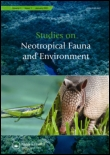
STUDIES ON NEOTROPICAL FAUNA AND ENVIRONMENT
Bridging Theory and Practice in Animal Science and EcologySTUDIES ON NEOTROPICAL FAUNA AND ENVIRONMENT is a distinguished academic journal published by Taylor & Francis Ltd, dedicated to advancing the fields of Animal Science, Zoology, and Ecology. With an ISSN of 0165-0521 and an E-ISSN of 1744-5140, this journal has been a significant outlet for scholarly research since its inception in 1976, continuing to provide critical insights into neotropical biodiversity and the environmental intricacies of this rich ecological region through 2024. Recognized in the Q3 category for both Animal Science and Ecology, the journal ranks at #232/490 in Animal Science and Zoology and #402/721 in Ecology, marking it as a valuable resource for researchers, professionals, and students interested in ecological and zoological studies. By offering a platform for innovative research and comprehensive reviews, the journal aims to bridge the gap between theory and practical application, facilitating a deeper understanding of the unique challenges and conservation strategies relevant to neotropical ecosystems. Although not an open-access journal, it plays a crucial role in fostering academic discourse and knowledge dissemination in its field, ensuring that critical advancements in understanding neotropical fauna and environmental dynamics reach a diverse and engaged audience.

Journal of Asia-Pacific Biodiversity
Connecting researchers to foster biodiversity insights and conservation.Journal of Asia-Pacific Biodiversity is an esteemed academic journal dedicated to advancing knowledge in the dynamic fields of biodiversity, ecology, and related biological sciences. Published by the NATL SCIENCE MUSEUM & KOREAN NATL ARBORETUM, this journal serves as a crucial platform for researchers and professionals seeking to explore and disseminate impactful findings pertaining to the Asia-Pacific region's rich biological diversity. With an E-ISSN of 2287-9544, the journal is indexed in leading databases, achieving a Q3 ranking across various categories in 2023, including Animal Science and Zoology, Ecology, Insect Science, and Plant Science. It strives to unite scientific research across disciplines, thus fostering a deeper understanding of ecological dynamics and conservation efforts within this vital region. The journal operates with an open access policy, ensuring that findings are widely available for widespread benefit, making it an essential resource for students, researchers, and environmental practitioners alike. Since its initiation in 2013 and continuing through 2024, the journal remains committed to delivering high-quality, peer-reviewed articles that contribute significantly to the global conversation on biodiversity and ecosystem sustainability.
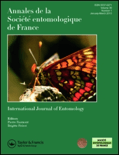
ANNALES DE LA SOCIETE ENTOMOLOGIQUE DE FRANCE
Advancing the frontiers of insect science.ANNALES DE LA SOCIETE ENTOMOLOGIQUE DE FRANCE, published by Taylor & Francis Ltd, is a prestigious journal that focuses on the dynamic field of entomology, offering a platform for the dissemination of innovative research related to insect science and ecological systems. With an increasing impact factor and notable quartile rankings (Q2 in both Ecology, Evolution, Behavior and Systematics, and Insect Science), the journal serves as a vital resource for researchers, professionals, and students alike, stimulating advances in our understanding of insect biology and its implications for broader ecological contexts. Although it is not an Open Access journal, it boasts a strong reputation within the academic community, as evidenced by its significant Scopus rankings and a commitment to high-quality peer-reviewed content. With its extensive historical archive since 1988 and a continuous publication schedule through 2024, ANNALES DE LA SOCIETE ENTOMOLOGIQUE DE FRANCE remains an essential reference for those engaged in the study of entomology and related ecological fields. For more information, visit the publisher's site at Taylor & Francis Ltd.